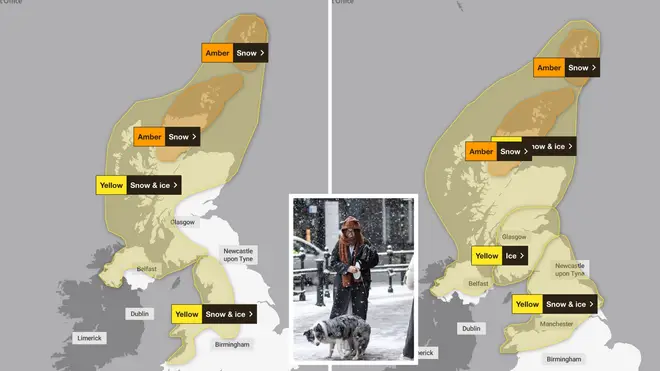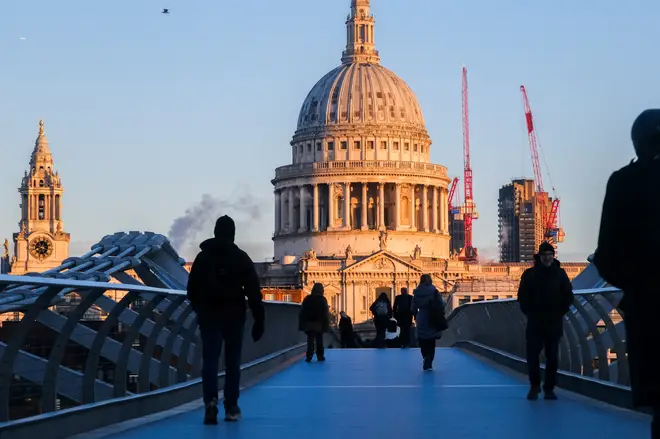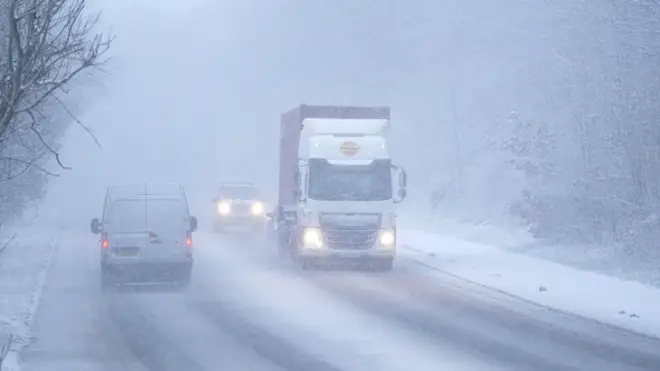
Paul Brand 3pm - 6pm
17 January 2024, 09:36

Fresh warnings have been issued for snow in the UK after temperatures dropped to the coldest of the winter so far.
According to provisional recordings by the Met Office, the mercury fell to minus 14C in Dalwhinnie in Scotland on Tuesday night, reportedly the lowest January temperature in Britain since 2019.
Forecasters had predicted some snow-covered parts of Scotland could reach minus 15C overnight, which would have been the coldest January night for 14 years, when minus 22.3C was recorded in 2010.
The Met Office has issued amber warnings for snow between 3pm on Wednesday and 6pm on Thursday in north-west Scotland and the Northern Isles, meaning road delays are likely and some vehicles could be stranded.
The forecaster said some areas could see an extra 15 to 20cm of snow, meaning power cuts are likely and more remote communities are at risk of being cut off.
It comes after the Met Office said more than 40cm of snow may fall on high ground in north-west Scotland by the end of Friday.
Tuesday night did mark the coldest night this winter so far, beating the minus 12.5C daily minimum temperature recorded at Altnaharra in the Scottish Highlands on December 3.
Freezing temperatures and snow will continue for much of Britain this week because of cold Arctic air before "potentially disruptive" stormy weather lands over the weekend.
A Cold-Health Alert was also issued by the UK Health Security Agency, which warns of possible impacts for the health and social care sector.
More than 100 schools in Scotland were forced to close due to the freezing conditions on Tuesday, with others opening later.
There were 22 school closures in Aberdeenshire while almost all other schools were either opening late, facing transport issues or were partially closed.
In the Highlands, 75 schools were closed while others were partially closed or had delayed openings. Twenty-six schools in Shetland were closed.
Schools in England were also affected, with at least 35 schools closed in Merseyside and several closed in Manchester.

A Met Office spokeswoman said the low temperatures are also due to how long the cold snap has lasted.
She said: "It's due to the prolonged nature of this cold spell, it will have been lasting for quite a few days.
"A build up of snow, as well, just allows for the temperatures to get colder and colder and we don't often see a cold spell last three to five days.
"The air is coming directly from the Arctic, so it is exceptionally cold air.
"It's staying cold until Friday, and then looking further ahead into the weekend we've got some deep areas of low pressure pushing in, so a big change in weather type, and we could see some stormy conditions by the end of the week.
"The cold isn't lasting right to end of the week, but we have a very different type of potentially-disruptive weather arriving."
Temperatures of -15C were expected for parts of Scotland, overnight which would be the lowest recorded overnight temperature in 14 years.
Read more: 10,000 Brits offered Cold Weather Payment - are you eligible?
Snow continues to fall across some northern and western parts of the UK this morning, take extra care if travelling 🚶♀️🚗
— Met Office (@metoffice) January 16, 2024
Stay #WeatherAware ⚠️ pic.twitter.com/ucI4eAvvND
Meanwhile, commuters faced major rail and road disruption on Tuesday morning.
National Highways put in place a severe weather alert for snow across the north west, with Brits warned to take extra care and plan ahead for trips on the road.
Some rural communities also face being temporarily cut off amid the cold snap.
Amy Fellows, national network manager at National Highways, said: "Freezing conditions bring so many hazards such as snow and ice, so take every possible step to understand your journey in advance and allow lots of extra time when travelling to prepare for the unexpected."
National Rail warned that the wintry weather could impact train journeys all week, with ScotRail saying services on the Highland Mainline route on Tuesday would be delayed by around 30 minutes.
Northern Scotland is expected to see 20cm of snowfall, with other areas in the north facing rain and sleet.
A "cold plunge of Arctic air" has moved south across the whole country over the past few days, making it 5C to 6C lower than usual for this time of year, the Met Office said.
But despite temperatures plummeting, dry and sunny spells are still expected further south.
🌨️ Outbreaks of sleet and snow becoming more persistent this morning in parts of Scotland, Northern Ireland and northern England
— Met Office (@metoffice) January 16, 2024
Brighter spells in Wales and southern and central England with crisp winter sunshine
⚠️Stay #WeatherAware pic.twitter.com/FbI4ryLjjU
Met Office forecaster Craig Snell said Tuesday could see a "persistent band of snow" over three to six hours across Scotland, Northern Ireland and parts of northern England and Wales.
He said: "In the early hours of the morning we're looking at temperatures getting down to -12C in a few spots, Tuesday night possibly down to -15C.
"So certainly a very cold spell into Wednesday."
Met Office chief meteorologist Andy Page said: "There will be widespread frost this week and we could see some fairly deep laying snow in parts of northern UK and strong winds could result in drifting or blizzard conditions at times.
"The snow and ice will be disruptive and could potentially impact travel plans, make driving dangerous and pavements slippery."

Forecasters say there is the potential for "some snow" in southern England mid-week as a low-pressure system moves across northern France.
Deputy chief meteorologist Nick Silkstone said: "The track of this system still has some small but all-important uncertainties tied to its northern extent, and it has the potential to bring some snow to southern England.
"However, our preferred solution suggests minimal snowfall (a couple of cm at most) across parts of the extreme south of England in association with this system, but we are keeping an eye on how things develop and will update the forecast as needed."
⚠️ Weather warnings for snow and ice over the next few days have been updated ⚠️
— Met Office (@metoffice) January 15, 2024
Latest info 👉 https://t.co/QwDLMfRBfs
Stay #WeatherAware⚠️ pic.twitter.com/DVxoTMAYg5
It comes as the Government confirmed thousands of households in England and Wales are eligible for cold weather payments.
They are made to vulnerable people, including pensioners, to help them pay for heating when the temperature dips below freezing.
It goes to those living in an area where the average temperature is recorded as, or forecast to be, 0C or below over seven consecutive days.
Payments will be made to homes across Cumbria, Oxfordshire, Yorkshire, Northumberland, Norfolk, Staffordshire and Powys in Wales.